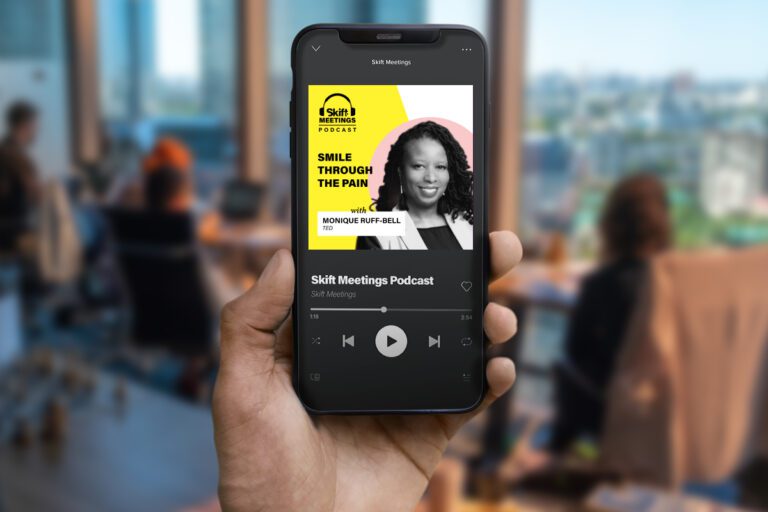As chief program and strategy officer for TED, Monique Ruff-Bell oversees the organization’s flagship global events and conferences, as well as other key marketing verticals. Most know TED for its flagship events like TED, but there were 3,400 other events held last year across 142 countries, bringing together 600,000 attendees in local communities.
Women Leaders in Meetings is a new series celebrating the remarkable female leaders who are not only excelling in the meetings and events industry but also championing inclusivity and diversity at the top. Each month, we highlight women who are breaking barriers, lifting others as they rise, and leaving a lasting legacy of empowerment. These leaders are redefining success by fostering a more inclusive industry and paving the way for future generations. Join us as we honor the achievements and impact of these inspiring women who are making a difference in the world of meetings and events.
What qualities do you believe make a good leader?
A good leader inspires trust, communicates effectively, is collaborative, and cares about not only success metrics but professional development of their teams. They balance vision with empathy, providing clear direction while remaining approachable and supportive while empowering others.
How would you define your leadership style?
My leadership style is collaborative and people-focused with a mix of quiet leadership and power. I prefer to inspire respect through a calm presence while being thoughtful in my actions. You don’t have to be the loudest in the room, the most dominant or most assertive. That influence can come through humility, emotional intelligence, and action over words.
I work hard to combine strategic thinking with emotional intelligence. I started to value emotional intelligence when I came across people who exhibited the exact opposite. Seeing people who interrupt or dismiss others, overreact to minor issues, are overly critical, selfish or insensitive. That wasn’t anything I wanted to be. Leaders always got the best out of me when they were supportive, empathetic, clear, focused, and great teachers. So I wanted to treat people the way I liked to be treated, which meant leaning into emotional intelligence and practicing it as often as I could. Also, I’ve learned from mentors who modeled strong EI as well.
What skills have you developed that have helped you grow into the leader you are today?
Key skills I’ve developed include strategic thinking. Balancing short-term goals with long-term vision and thinking about how we are constantly evolving and ways we can plan for longevity and sustainability.
Emotional intelligence — understanding and managing emotions, both mine and my team’s.
Effective communication by ensuring clarity, listening actively, and fostering open dialogue. I’m always thinking of ways to showcase what effective communication skills can look like in managing up and in managing down with my team.
As a leader, what are the challenges that keep you up at night?
Budgets, costs, creating and leading best-in-class teams.
Another significant challenge is balancing ambitious goals with available resources.
And lastly, the increasing polarization within the country and its impact on how conferences and meetings are produced is a real challenge. This manifests in content curation sensitivity and how to strike a balance between addressing pressing societal topics and avoiding polarizing issues that could alienate segments of the audience and location and vendor selection, where you have to navigate political climates in various regions to ensure inclusivity and accessibility while mitigating potential backlash.
Which female leaders have inspired you the most?
My mom, for one. She was a single mom who worked two jobs for 30 years to ensure I had everything I ever needed. She was my north star on how to work hard, love hard, and fight for your dreams.
Business leaders also inspire me. Ursula Burns, the first Black woman to lead a Fortune 500 company, whose leadership at Xerox demonstrated bold decision-making and innovation. Her achievement paved the way for greater representation in the highest leadership levels and helped me see what is possible for myself within business.
Sheila Johnson, co-founder of BET and founder of Salamander Hotels & Resorts, is a pioneering figure in luxury hospitality. She demonstrates how to be a phoenix that rises from the ashes. When I read her book on her life and leadership, she gave me a much sharper outlook on ways to dream bolder and louder. She helped me see what true resilience looks like. She wasn’t expected to be the powerhouse she is today. She co-founded a television station, started a luxury hotel brand, has an ownership stake in three sports teams, and is a strong philanthropist. She showed me what it looks like to identify untapped opportunities and go for it.
Indra Nooyi, former CEO of PepsiCo, for her strategic innovation and focus on long-term value for anything you lead. Her leadership style has heart and empathy. She emphasizes investing in the future, but always in a sustainable way. She created opportunities within PepsiCo to support work-life balance and advocated for sustainability and health at every turn. She showed that you could be profitable and empathetic all at the same time.
Their ability to always lead with authenticity, resilience, and vision has shaped my approach to challenges and opportunities.
How has mentoring helped you become the leader you are today?
Mentoring has been instrumental and foundational in shaping my personal leadership journey. It has taught me the power of active listening and how truly understanding others can build trust and uncover new possibilities.
It has enhanced my curiosity, which has helped me to produce innovation and deeper connections between me and the teams I manage. And, of course, it has made continuous learning for me, which has helped with my growth around adaptability. Being a mentor or mentee can produce a positive impact that extends beyond the immediate relationship.
Both mentors and sponsors have been integral to my career trajectory. Mentors have helped me navigate challenges, helped me focus on developing key skills, and provided emotional support through tough or challenging times, which helped me become resilient.
Sponsors, on the other hand, have leveraged their influence to open up doors for me and get me access to rooms I would have never been able to get into on my own. They have championed my career advancement and created opportunities for me. I absolutely needed both to get to where I currently am in my career.
Can you share advice for aspiring women leaders in meetings?
Build alliances. To build trust and support, foster relationships with colleagues and industry contacts across all levels. You want people to speak your name in rooms you’re not always in.
Set clear goals. Enter meetings with a clear purpose. Whether it’s to gather insights, make decisions, or achieve alignment, be clear about what you aim to accomplish so that the meeting can be useful and not dreadful. Identify the resources or information you need, and strategize how to leverage the meeting effectively to get it. Clarity ensures focus and the outcome that you want and need.
Take ownership of your career. Be proactive in seeking opportunities, building skills, and growing your network. Don’t just focus on who you are today; keep an eye on future you. While it’s tempting to stay comfortable in the present, growth happens when you constantly challenge yourself to think ahead. Even during periods of stability, it’s important to prioritize building a pipeline of opportunities, ideas, and connections that can eventually unlock new opportunities for yourself.
To learn more about Monique Ruff-Bell, be sure to listen to this episode of the Skift Meetings Podcast.


Monique Ruff-Bell: Smile Through the Pain
Monique Ruff-Bell is chief program and strategy officer at TED Conferences, a new role for the organization. Just as TED is known for powerful ideas, powerfully presented, Ruff-Bell’s road to this role is an inspiring one.
9 months ago
👇Follow more 👇
👉 bdphone.com
👉 ultraactivation.com
👉 trainingreferral.com
👉 shaplafood.com
👉 bangladeshi.help
👉 www.forexdhaka.com
👉 uncommunication.com
👉 ultra-sim.com
👉 forexdhaka.com
👉 ultrafxfund.com
👉 ultractivation.com
👉 bdphoneonline.com




